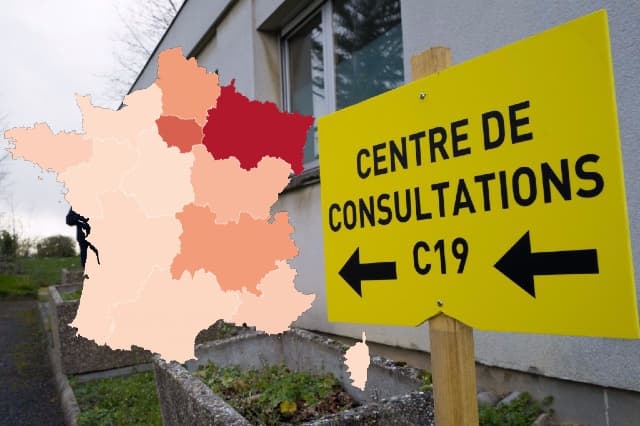MAP: Which regions of France are most affected by coronavirus?

LATEST: The number of coronavirus cases in France continues to rise although some regions are more affected than others. This map gives an idea of how the outbreak has affected different parts of France.
This article is no longer being updated as detailed regional figures are no longer being produced. Click here for a look at which areas' health systems are the worst affected.
France has reported more than 11,000 confirmed cases of coronavirus with the numbers steadily rising each day, the death toll continues to rise with over 370 deaths as of Friday, March 20th.
The focal point for the outbreak in France was the Oise département in the northern region of Hauts-de-France.
The greater Paris region of Île-de-France now have close to 3,500 confirmed cases. Authorities stated in the beginning that many of these cases are patients linked to the outbreak in the Oise département, who had been transferred to specialist hospitals in the Paris region. However the spread has now become much more severe.
For the latest information on the situation in France, click here
All the mainland regions of France have more than 100 confirmed cases, with many closer to 1,000 or more.
Overseas territories: Guadeloupe, Saint-Barthélémy, Saint-Martin, Guyane, Martinique, Mayotte and La Réunion have all seen cases of the virus.
READ ALSO: Coronavirus in France - How worried should you be?
The figures used for the map are the latest, published by France's national health body Santé Publique France on March 20th.
!function(){"use strict";window.addEventListener("message",function(a){if(void 0!==a.data["datawrapper-height"])for(var e in a.data["datawrapper-height"]){var t=document.getElementById("datawrapper-chart-"+e)||document.querySelector("iframe[src*='"+e+"']");t&&(t.style.height=a.data["datawrapper-height"][e]+"px")}})}();
And how is the situation in Europe?
!function(){"use strict";window.addEventListener("message",function(a){if(void 0!==a.data["datawrapper-height"])for(var e in a.data["datawrapper-height"]){var t=document.getElementById("datawrapper-chart-"+e)||document.querySelector("iframe[src*='"+e+"']");t&&(t.style.height=a.data["datawrapper-height"][e]+"px")}})}();
!function(){"use strict";window.addEventListener("message",function(a){if(void 0!==a.data["datawrapper-height"])for(var e in a.data["datawrapper-height"]){var t=document.getElementById("datawrapper-chart-"+e)||document.querySelector("iframe[src*='"+e+"']");t&&(t.style.height=a.data["datawrapper-height"][e]+"px")}})}();
!function(){"use strict";window.addEventListener("message",function(a){if(void 0!==a.data["datawrapper-height"])for(var e in a.data["datawrapper-height"]){var t=document.getElementById("datawrapper-chart-"+e)||document.querySelector("iframe[src*='"+e+"']");t&&(t.style.height=a.data["datawrapper-height"][e]+"px")}})}();
!function(){"use strict";window.addEventListener("message",function(a){if(void 0!==a.data["datawrapper-height"])for(var e in a.data["datawrapper-height"]){var t=document.getElementById("datawrapper-chart-"+e)||document.querySelector("iframe[src*='"+e+"']");t&&(t.style.height=a.data["datawrapper-height"][e]+"px")}})}();
!function(){"use strict";window.addEventListener("message",function(a){if(void 0!==a.data["datawrapper-height"])for(var e in a.data["datawrapper-height"]){var t=document.getElementById("datawrapper-chart-"+e)||document.querySelector("iframe[src*='"+e+"']");t&&(t.style.height=a.data["datawrapper-height"][e]+"px")}})}();
Comments
See Also
This article is no longer being updated as detailed regional figures are no longer being produced. Click here for a look at which areas' health systems are the worst affected.
France has reported more than 11,000 confirmed cases of coronavirus with the numbers steadily rising each day, the death toll continues to rise with over 370 deaths as of Friday, March 20th.
The focal point for the outbreak in France was the Oise département in the northern region of Hauts-de-France.
The greater Paris region of Île-de-France now have close to 3,500 confirmed cases. Authorities stated in the beginning that many of these cases are patients linked to the outbreak in the Oise département, who had been transferred to specialist hospitals in the Paris region. However the spread has now become much more severe.
For the latest information on the situation in France, click here
All the mainland regions of France have more than 100 confirmed cases, with many closer to 1,000 or more.
Overseas territories: Guadeloupe, Saint-Barthélémy, Saint-Martin, Guyane, Martinique, Mayotte and La Réunion have all seen cases of the virus.
READ ALSO: Coronavirus in France - How worried should you be?
The figures used for the map are the latest, published by France's national health body Santé Publique France on March 20th.
Join the conversation in our comments section below. Share your own views and experience and if you have a question or suggestion for our journalists then email us at [email protected].
Please keep comments civil, constructive and on topic – and make sure to read our terms of use before getting involved.
Please log in here to leave a comment.